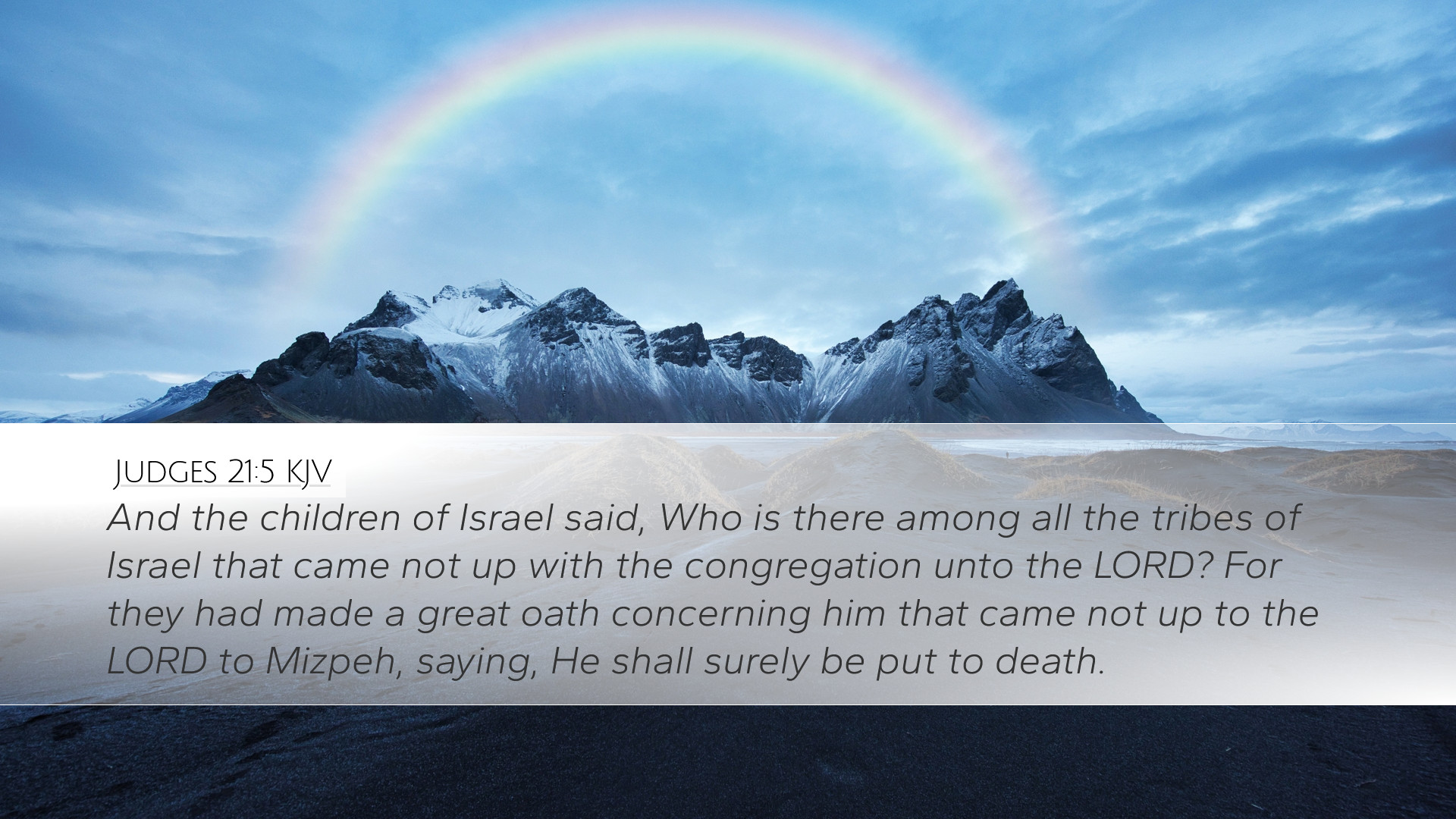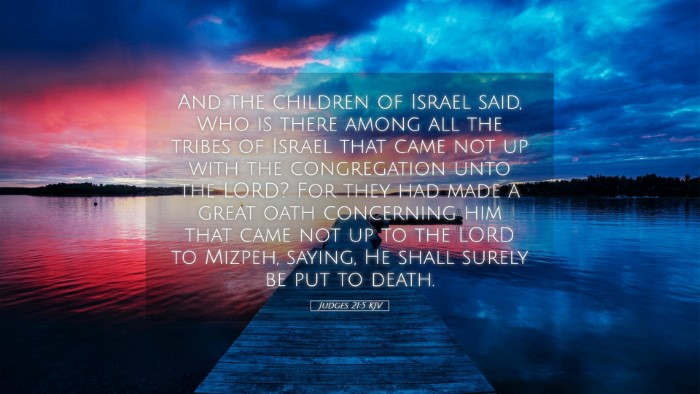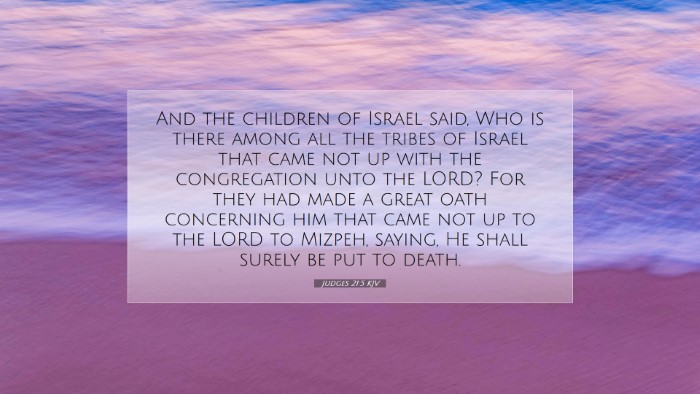Commentary on Judges 21:5
Judges 21:5 states: "And the children of Israel said, Who is there among all the tribes of Israel that came not up with the congregation unto the Lord? For they had made a great oath concerning him that came not up to the Lord to Mizpeh, saying, He shall surely be put to death."
Introduction
The occasion recorded in Judges 21 reveals the gravity of oaths taken by the Israelites and the consequences of those who failed to uphold communal worship. This particular verse serves as a critical commentary on the zeal for religious unity and obedience that characterized the Israelites during this tumultuous period of Israel's history.
Contextual Analysis
This verse comes at a time when Israel faced a crisis resulting from the outrage against the tribe of Benjamin due to a grievous crime committed in Gibeah. The Levite's concubine was brutally abused, leading to her death, which sparked a civil war between the tribes of Israel. The events had unsuitable consequences, forcing the Israelites to reassess loyalty among tribes and adherence to their covenant with God.
Historical Insights
Triggers for such oaths can be seen in the history of Israel where oath-taking could signify devotion to God’s commands and communal integrity. The Israelites had gathered at Mizpeh, a significant place of assembly, indicating their intent to seek divine guidance and execution of justice against sin.
The Nature of Oaths
Oaths hold immense importance in Biblical tradition; they represent a solemn commitment to God. In this case, the Israelites, motivated by a spirit of unity against sin, took an oath to condemn any tribe that did not participate in the great assembly. The following commentary breakdown provides deeper insights into the underlying themes present in Judges 21:5.
1. The Importance of Community Worship
- Spiritual Unity: This passage underscores the significance of coming together in worship. The Israelites' inquiry about absent tribes reflects a broader understanding that spiritual life is communal.
- Corporate Responsibility: Every tribe's participation was vital, and the absence indicated a failure of responsibility. The entire community shared both blessings and accountability.
2. The Consequences of Non-Participation
- Vow to God: The oath taken illustrates the serious consequences of neglecting worship and the covenant community. It serves as a warning to future generations about the importance of commitment to God.
- Judgment for Transgression: The notion of death for non-participation reflects divine legalism where the absence was tantamount to rebellion against God’s order.
3. The Theme of Zeal for God’s Honor
- Devotion Over Indifference: The Israelites displayed fervent commitment to God by affirming their covenant obligations. Their commitment was not simply ritualistic but an expression of their bond with the Divine.
- Preserving Holiness: Their pledge was also a mechanism to preserve the integrity of the nation and its covenant with God. Such zeal is reminiscent of the reformers throughout Biblical history who sought return to covenant fidelity.
Reflections from Noteworthy Commentators
Matthew Henry's Insights
Matthew Henry emphasizes the importance of looking out for one another within the covenant community. He notes that the phrase, "Who is there among all the tribes of Israel that came not up with the congregation unto the Lord?" signifies the urgency to uphold the integrity of community worship. Henry reflects on how the Israelites sought the Lord together, and their unity in obedience was critical, especially after such grievous acts had split their society.
Albert Barnes' Commentary
Albert Barnes points out that the Israelites recognized the necessity for participation in worship as a measure to maintain their identity as God's people. The solemn vow they made regarding punishment for those who lacked involvement was not just punitive but also aimed at ensuring that the worship ordered by God was honored by all. Barnes argues that this reflects a communal sense of urgency to address sin, highlighting that individual transgressions can endanger the whole community.
Adam Clarke's Interpretation
Adam Clarke focuses on the implications of the oath and the condition of the Israelites' hearts. He asserts that their eagerness to inquire about the absent tribes indicated a genuine desire for collective holiness. Clarke elucidates on the dangers of isolation from communal worship, warning that it poses risks to spiritual well-being and national identity. He further discusses how their oath serves as a vehicle for them to articulate their commitment to God’s directives and express their unity as one nation.
Application for Modern Readers
This verse serves as a pertinent reminder to contemporary believers regarding the significance of corporate worship and communal responsibility. The themes surrounding oaths in Judges 21:5 challenge individuals and communities today to reflect on their commitment to each other and to God. Some key takeaways include:
- Emphasizing Community: In an era marked by individualism, embracing communal worship and accountability in faith communities should be nurtured.
- Understanding the Weight of Vows: Taking vows lightly can lead to serious spiritual ramifications. Believers must consider their commitments before God as sacred.
- Upholding the Values of the Covenant: The seriousness with which the Israelites approached participation in worship should inspire modern Christians to engage deliberately in their faith practices.
Conclusion
Judges 21:5 resonates beyond its historical context, challenging believers today to reflect deeply on the collective nature of worship, the seriousness of oaths taken before God, and the shared responsibility within the community of faith. It is a call to uphold fidelity to God and to seek His presence together, reinforcing the truth that the strength of a community lies in its unity and commitment to divine guidance.


